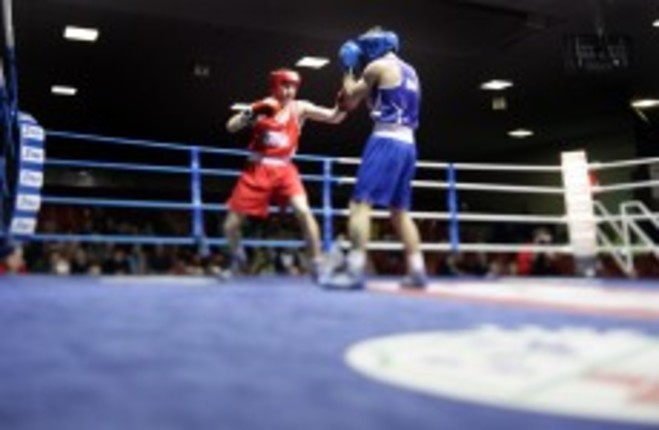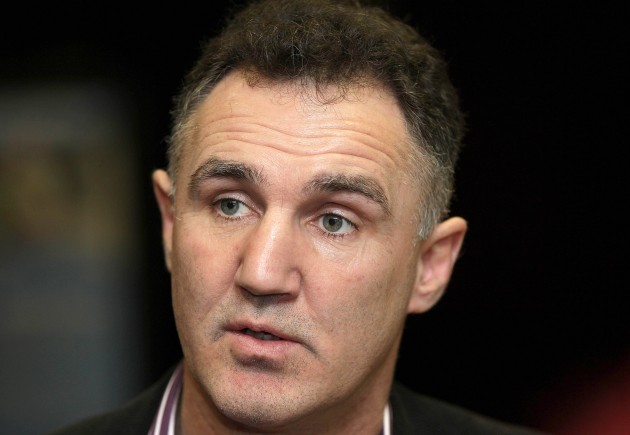EARLIER IN THE year, as the numbers were whittled down during the National Amateur Boxing Championships, a torrent of tweets were flung in the direction of RTÉ Head of Sport, Ryle Nugent.
They were furious at what they perceived to be the state broadcaster’s lack of coverage of the event and the fact that only certain finals were being shown live while the highlights of others were limited.
But whatever about their gripe when it came to television hours, there was at least one point worth carrying away from the wreckage of the debate — the place the discipline now holds within the Irish sporting spectrum.
Because, regardless of the wider public interest, it’s importance cannot be glossed over.
Indeed beside soccer and rugby, on an international stage it comfortably takes a place on the podium of Irish team sports.
Right now the latest version of the squad are at a training camp in the Ukraine, ahead of the final men’s Olympic qualifier from the 13th to the 22nd of April.
Thus far only three Irish boxers are guaranteed their place in the ring in London and that it would be seen as somewhere between a disappointment and a disaster if at least three of Katie Taylor, Joe Ward, Paddy Barnes, David Oliver Joyce, Adam Nolan, Ross Hickey and Tommy McCarthy didn’t go as well shows the strength of the sport here.
But just as impressive as its standing is its journey because, consider the following.
Just eight years ago Ireland headed for an Olympics with a single boxer. It was the second successive Games that a lonely Irish fighter had left for the boxing tournament, and before Beijing, after all the promises made with medals in Barcelona, the national team had spent 17 years without getting within six punches of a podium place.
It’s hard to believe we are now in a place that you will want to tell your children about.
Team Ireland’s Joe Ward, left, training in the gym during the teams 8 day training camp at The Curragh. Pic: INPHO/Cathal Noonan
But aside from bald and cold statistics, it’s an inspiring journey of revolution followed by evolution that shouldn’t be forgotten amidst all the expectations and success of the present. Just a couple of generations of fighters have come and gone since Nicholas Cruz, the quirky and fascinating Cuban coach that defected to help us out, inspired all around him here.
But his first impressions were, at least in his mind, surprising ones. In his native land, money was scarce and facilities superb. Relatively, Ireland was the complete opposite and it was little wonder that he saw it like that.
In the late 1980s he took his new team to Kerry for a training camp but found nothing but a ring on the ground floor of the hotel. In the end he borrowed a sledgehammer and tyre from a nearby yard and used them for cardio and strength work; he smashed rocks and used the smaller pieces as dumbbells; he used trees for chin-ups; and, long before Ger Loughnane, he had his team doing squats up and down the dunes on a nearby beach. Then he went looking for a masseuse to the amusement of higher powers.
Science and sweat
It got worse because when he returned to Dublin, he found his living quarters to be the kitchen of the old National Stadium, a dilapidated building that wasn’t fit for animals, never mind a dedicated teacher with a message to preach.
It should have been no great surprise then that, with no chance of science to go with the sweat, and other than a freakish result in Barcelona, boxing here was myred in mediocrity for so long.
Indeed any stereotypical talk of the fighting Irish could and should only have been used to describe what went on upstairs in committee rooms.
But it was then that Gary Keegan and Billy Walsh were introduced and the story and its direction took a sudden swerve. It’s rare that sport in this country has been blessed with two such ruthless and brilliant minds working in unison and sadly it’s been overlooked too often as well. Keegan was the meticulous planner with the brilliant intellect.
Walsh was the forceful implementor who was engaging and had a connection to all of his fighters. Between them they showed what could be done here and set up a model that other small sports should be forced to follow in their quest for high-class performance.
From the day early into the new millennium when Keegan took a piece of white tape and ran it across the national stadium floorboards, everything changed. He told the boxers that those who crossed over would be taken on a journey that would ultimately involve as much success as sacrifice and it wasn’t a word of a lie.
As they learned how to train and do things differently, off he went around Europe, and spent six months sending emails to the French high performance unit just to get a foot in the door.
When they were finally invited to Paris he asked why it had taken so long to get a reply and was told it was because the Irish boxing team had a reputation for drink and for a lack of discipline that the French didn’t want infecting their gym and their system. There and then was the contrast between the old failures of Ireland and the new order that began the march on today.
Ireland Boxing High Performance coach Billy Walsh Pic: INPHO/Morgan Treacy
Now though it’s the small and pokey gym on the South Circular Road that the world wants to get into. Keegan has moved on but these days it’s Walsh who is dealing with emails and requests from others who want to see how we do it because we do it better than almost anyone else. It’s that system and those fighters that are right in front of us now and they deserve more respect and appreciation because here in a low-cost facility are a group of dedicated and successful athletes from all walks of life.
From Joe Ward the traveller to Darren O’Neill the teacher. From Paddy Barnes with his city ways and indecipherable Belfast accent to Ross Hickey with his thick country drawl.
So whatever about the monetary and scheduling issues that allow RTÉ to show them all sporadically, the rest of us should sit back and bask in it, because stories like these always come to an end at some stage.



